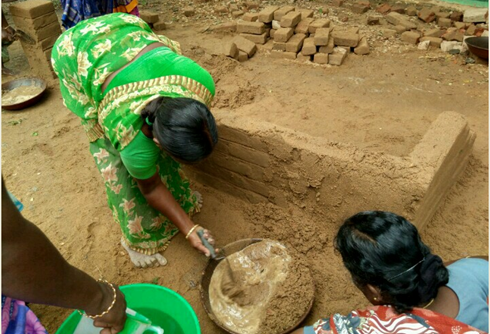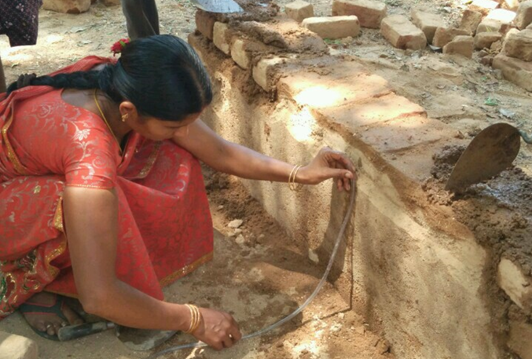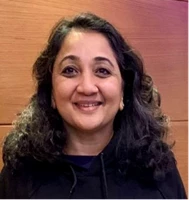Parvati Amma comes from Pulkattai village in the southern Indian state of Tamil Nadu where the Tamil Nadu Empowerment and Poverty Reduction Project (TNEPRP) has conducted a unique experiment. In an effort to raise the very low levels of women’s participation in India’s labor force, it is helping rural women break into jobs that are traditionally held by men, where they could increase their earnings significantly.
In this part of Madurai district, most of the men folk are successful masons. The women worked as helpers, merely passing tools to the men as they laid brick over brick to build houses and office blocks. Being unskilled, the women earned half the men’s wages.
Even though Tamil Nadu is one of the most urbanized states in India with high literacy rates, new buildings are proceeding apace amidst the state’s booming construction industry, attracting over a million migrant workers - more than a tenth of whom work as unskilled labor. There is, however, a paucity of trained masons.
The challenge for the women was to take on age-old social and cultural barriers and enter into this exclusive male preserve. Masonry has never been seen as a woman’s job in India, much less in this conservative rural area. For a start, the women wear sarees that constrain them from climbing onto scaffolding to build the higher storeys. Masons are also required to travel long distances for work, and staying away from their families is not something the women could easily do. Apart from mobility constraints and worksites that are not women-friendly; domestic responsibilities, burden of child and elderly care, and a conservative societal outlook, are all challenges.
Nonetheless, the women of Madurai’s Pulkattai village were not to be daunted. They saw this as an opportunity to prove their worth and double their wages in the bargain.

Supported by a visionary panchayat president and an expert mason from the village who had confidence in the women’s capability - Parvati Amma and 25 other women joined the masonry training offered by the project.
How did the women fare?
Over a period of 45 days, the women gained hands on experience, measuring heights and widths, and learning how to layer the bricks smoothly – undeterred by the measures and calculations owing to their basic literacy and numeracy skills. When the course was over, their skills were assessed and certified by a reputed state agency - the Tamil Nadu Small and Tiny Industry Association.
Interestingly, while Parvati Amma topped the class, none of the women who joined with her failed the assessment. And fifteen of them went on to work in construction with the menfolk and some took up contracts in local areas accessible by public transport. Some even chose to wear the salwar kameez for climbing stairs and scaffoldings more easily. Although they were paid Rs. 400 per day compared to Rs. 500 for the men, this was still twice what they earned as helpers.
Today, Parvati Amma proudly proclaims, “We have proved that women can be as good masons as men where quality is concerned. We are also much more efficient. But,” she adds somewhat frustrated, “that doesn’t seem to be enough.”

Male resistance
Perhaps expectedly, the women’s efficient and diligent work ethic has posed a serious challenge to their male counterparts. In the face of stiff competition, the block’s all-male Association of Masons, has refused to recognize the women’s capability and denied them membership. Without much market experience or access to established networks, the women are now finding it difficult to avail of new job opportunities.
The project is therefore working to remove these barriers by engaging with all-male associations and sensitizing the men. It is also working with local government authorities to adopt affirmative action for the women in their construction contracts.
Learnings
Though the going has not been easy, the Tamil Nadu women have shown that they too can be competitive in traditionally male sectors. This serves as a huge learning for other World Bank funded projects, including the Tamil Nadu Rural Transformation Project – a successor project, which are striving to increase women’s participation in India’s labor force, and enabling them to increase their earnings.
Since March 2016, the project has trained over 200 women masons in 15 districts of Tamil Nadu - with a 95 percent success rate. All told, more than 375,000 youth have been trained over the past decade under TNEPRP, of whom a large share - nearly 335,000 - are now gainfully employed.


Join the Conversation